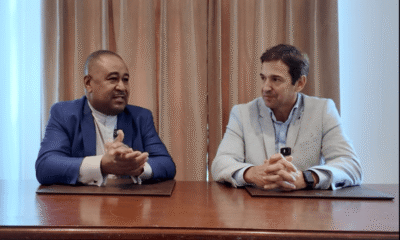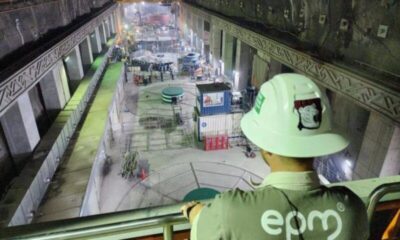Colombia’s Wine Scene Has Come a Long Way, Says Top Sommelier
Hector Bernal Rozo has worked as sommelier at some of Colombia’s top restaurants, such as globally recognized El Cielo in Bogotá, Medellín, and Miami. Since leaving Bogotá for the verdant mountainsides of Manizales, Bernal established wine wholesaler La Cava del Eje and has been contracted by the Industria Licorera de Caldas as a spirits expert.
As a certified sommelier, Bernal is a member of the Association of Sommeliers of Colombia. He is a member of Certified Sommeliers and was declared last year as Sommelier by the Association of Sommeliers of Colombia. In 2016, Beral also won first place nationally as best “Sommelier Revelación” in the 12th annual “Premios La Barra.”
Finance Colombia Executive Editor Loren Moss recently made the trip to Manizales to discuss the progression of Colombia’s wine scene with Bernal and also to understand why someone in the wine industry would abandon an international capital like Bogotá for a small, mountainous city in the middle of coffee country like Manizales, the middle-sized capital of the department of Caldas.
Bernal mentioned that raising a young family was part of it. The quality of life in Manizales for raising children was a major factor. However, surprisingly, and maybe not in small part because of Bernal, Manizales is not without fine dining options.
Starting in Buffalo Republic, a gourmet hamburger restaurant specializing in true buffalo meat, Bernal (shown above, left, with Buffalo Republic proprietor Diego Gutierrez) paired a Paolo Angelo Pinot Grigio by Piazza with a lunch of gourmet buffalo burgers.
Bernal also introduced us to one of several authentic French restaurants in town. His selection for us was L’ange Vin, established by French immigrant Alex Burgy and Caterin Franco in Manizales’ trendy Barrio Milan. Though Bernal wasn’t able to join us for this meal due to family obligations, he had pre-selected for us a 2014 Rio Albo Valpolicella by Ca’Rugate, which balanced nicely against entrées of pork loin over rustic Alsatian handmade pasta, and sirloin with scalloped potatoes.
(When still to early in the day for wine, Bernal also introduced us to gourmet coffee purveyors Kafetto, which Finance Colombia wrote about here.)
Finance Colombia: Do restaurant owners in Colombia understand the importance of having experts? How has the Association of Sommeliers developed here? I didn’t know that something like that existed in Colombia.
Hector Bernal Rozo: It has been growing. This was an undertaking by a group of adventurers that was led by John Jairo Hernandez, the president of the Association of Sommeliers of Colombia. He, together with sommelier friends — Jose Rafael Arango, Daniel Morales, and others — decided to create the Association of Sommeliers of Colombia in the hope of generating a culture of study. They hoped that a lot of people might get interested, not only in being waiters, but also that they might specialize in areas like being a sommelier. And this has kept on growing. The association gave them relevance.
Fortunately, nowadays in Colombia we have a great number of restaurants that have their floor sommelier in addition to importers that have sommeliers and send them to the different restaurants to provide their service. This offers a greater sommelier service. And they are the ones who, in the end, carry the consumption culture in Colombia.
Some of them are university professors. Others are salespeople for importers or specialize in writing in the media — sommelier journalists — and still others have to get our suitcases and travel around the different regions. We bring the culture and teach people how they can enjoy a good wine. Because before, here, we only used to drink other kinds of beverages.
Finance Colombia: My first time in Colombia, about 13 years ago, I was disappointed because at that time there was almost no fine wine in Colombia. Back then the only options were Gato Negro or Casillero del Diablo — there wasn’t much else in the stores. But it has developed a lot, and now in Colombia you can get some good wines. You can get imported wines from all over the world. Why has there been such a change? Why has there been so much growth and sophistication in the wine market in such a short time?
Hector Bernal Rozo: Well, we can separate your question and comment into several parts. The first thing is that a sommelier is a specialist in wines — it’s true. But also we are experts in all kinds of drinks, everything you can put on the table: tea, coffee, tobacco, liquors, rums, whiskies, water, cocoa. That’s the first thing.
The second thing is that you are quite right that both consumption and the sommelier’s knowledge have been increasing in Colombia. Ten, or 13, years ago there were only a few sommeliers, who we can call patriarchs even though they were young. There were about six sommeliers in Colombia. Nowadays there are about 420 to 500 sommeliers here between graduates and non-graduates.
Our task is to take the culture of wine consumption — to take the culture of spirits consumption — in a more cultural way. It is not just a question of whether I drink to get drunk. It has been a task of going about generating a culture of consumption. Good drinking for good living.
Finance Colombia: When did the change begin in the market here in Colombia? Apart from the sommeliers in fine restaurants, why now can you go to a shopping center and there are stores dedicated to wines and liquors with a much wider selection? What pushed those changes in the market?
Hector Bernal Rozo: Well, in the last decade, the very important thing that has happened is that — along with the growth in sommeliers’ knowledge and the growth in the number of sommeliers carrying out the task — there is also a better consumption in quality.
We have already changed. Before, not only did we not have good consumption in quantity, but also in quality. Nowadays, people consume with knowledge. We as sommeliers have the job of recommending consumers and diners what to drink, what to accompany their food with, what will come with a meal. It’s more than a dish — it’s a moment.

This Pinot Grigio from Piazza paired well with buffalo burgers and is an example of inexpensive quality wine now available in Colombia.
Thanks to this — to a greater knowledge — a demand for good products has been brought into the country. At the beginning, as you say, there were only industrial-type brands. Today, fortunately, thanks to this growth that we have seen in the per-capita wine consumption, low-production brands have been brought in from boutique sellers and handcrafted wines, which before 10 years ago were not available in the country. The only ones that were brought in were mass-produced wines at supposedly affordable costs. But if you compared the cost at origin and the price to the consumer, it was a gigantic gap.
Finance Colombia: There are also now some wines produced in Colombia. Why is Colombia not a wine producer like other countries in South America, like Argentina and Chile? What are the limitations that Colombia has in that respect?
Hector Bernal Rozo: Well, the truth is that to produce wine, the absolutely necessary condition is to have four seasons — and four very-well-defined seasons. This is for the production of a good wine. Colombia has been developing some plans, or pilot projects, where some wine sellers — between Santa Fe (tourism friendly wineries with on-site hotels such as Viña Sicilia and Portón del Sol) and Olaya in Antioquia — have been making some tests. They have been producing some interesting wines, some drinkable wines, some wines pleasing to the palate.
But since we don’t have four seasons for the vegetative cycle of the vine — which are short vegetative cycles — we don’t really have the conditions. That’s really what happens. We don’t have the conditions of climate and soil in this country that are needed to produce a good wine.
Finance Colombia: We’re talking here in Manizales, and I’m surprised — it’s not that I was expecting it to be bad — but surprised by the quality of the restaurants here. Manizales is known as a second-level city here in Colombia. Not as big as Cali, Medellín, Bogotá, or Barranquilla. How is the growth of wine production going in areas like Manizales, Pereira, Bucaramanga? And in all of Colombia?
Hector Bernal Rozo: Yes, it’s true. The fact that there are many of us sommeliers now living in medium-sized cities, and who like to offer our services in medium-sized cities, means we like to carry forth that culture.
Why do we go out to medium-sized cities? Why are we in cities like Pereira, Manizales, Bucaramanga, Cúcuta, where it should be said that consumption is increasing? It’s because there are people there who dedicate themselves to being in the restaurants, to putting the house in order, to being present at the most important events in the city.
In my personal case, we have even made administrative plans — city plans — where the public administration has been in charge of contracting our services to teach the restaurants how to organize their wine cellars, how to handle a good wine service, and how to choose some good wines. To be a bridge between producers, importers, and the end consumer by means of the restaurants — and in these cases also through city programs.
Finance Colombia: What is your prediction about the wine market in the next five years? Is it going to continue growing stably as it has been growing or are we going to see an acceleration? What changes can we expect in the market — and not only wines but all alcoholic beverages, especially at the high-end?
Hector Bernal Rozo: Up to 2013, we had an important growth in the consumption of wine. In 2013, there was a cutback due to a strong hand that came to establish laws about the control of the consumption of alcohol, including breath tests and campaigns against alcohol consumption while driving. This caused a cutback — which in some ways is very good, as social growth, because there are no longer irresponsible consumers who drink and drive.
That’s one part of it. Now, in 2017, they have tried to pass a new law about wines and alcoholic beverages, and that has also brought about a cutback. Because, unfortunately, it is making wine in Colombia very expensive. Foreigners come here, like in your case or many other cases, and they say, “I find wine at one price in my country, and now that I come here I find it at an exorbitant price.” The first thing they think is that the restaurant owner is overcharging them. No!
Really today, the taxes that have come into effect are very exaggerated, and this means that this is felt when the product is taken to the table. On the one hand, that has made us think that we in the next five years may see a deceleration — or even a loss of terrain that we had gained.
What do we need to maintain growth? To have some offers where the origin price is very good, and above all — and this “above all” is very important — for it to be given over to importers or traders here in the country who are fair when it comes to pricing. That means putting a price between the one they pay when they purchase at origin and the one they come and charge to the end customer, which in some cases is where a very high rise in price is generated.



























